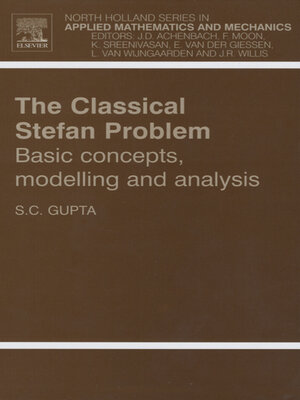The Classical Stefan Problem
ebook ∣ Basic Concepts, Modelling and Analysis · North-Holland Series in Applied Mathematics and Mechanics
By S.C. Gupta

Sign up to save your library
With an OverDrive account, you can save your favorite libraries for at-a-glance information about availability. Find out more about OverDrive accounts.
Find this title in Libby, the library reading app by OverDrive.



Search for a digital library with this title
Title found at these libraries:
| Library Name | Distance |
|---|---|
| Loading... |
This volume emphasises studies related to classical Stefan problems. The term "Stefan problem" is generally used for heat transfer problems with phase-changes such as from the liquid to the solid. Stefan problems have some characteristics that are typical of them, but certain problems arising in fields such as mathematical physics and engineering also exhibit characteristics similar to them. The term ''classical" distinguishes the formulation of these problems from their weak formulation, in which the solution need not possess classical derivatives. Under suitable assumptions, a weak solution could be as good as a classical solution. In hyperbolic Stefan problems, the characteristic features of Stefan problems are present but unlike in Stefan problems, discontinuous solutions are allowed because of the hyperbolic nature of the heat equation. The numerical solutions of inverse Stefan problems, and the analysis of direct Stefan problems are so integrated that it is difficult to discuss one without referring to the other. So no strict line of demarcation can be identified between a classical Stefan problem and other similar problems. On the other hand, including every related problem in the domain of classical Stefan problem would require several volumes for their description. A suitable compromise has to be made. The basic concepts, modelling, and analysis of the classical Stefan problems have been extensively investigated and there seems to be a need to report the results at one place. This book attempts to answer that need.







